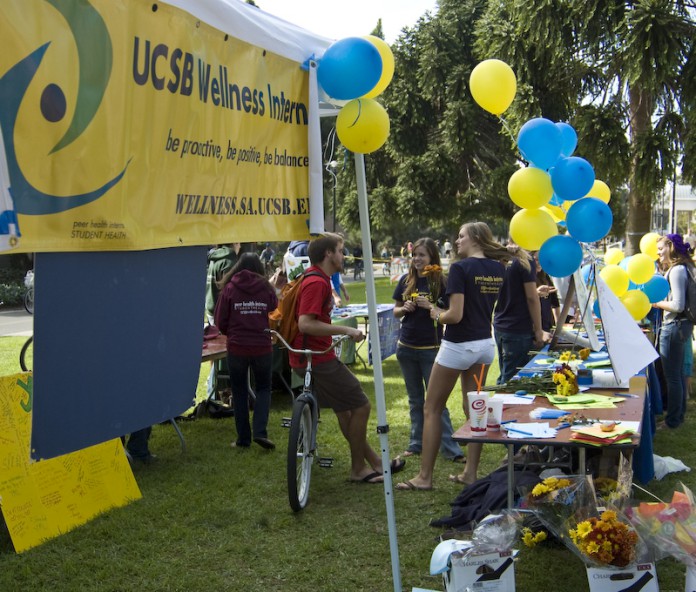Helen Tracey
World Kindness Day was on Wednesday, Nov. 4 this year, and the Peer Health interns from the Health and Wellness Center came out in full force for the “Science of Happiness” event, held from 10 a.m. – 2 p.m. on the lawn across from the Career and Counseling Services building.
Smiles and blue and yellow balloons greeted students as they approached the tables smattered with letter envelopes, tiny notebooks, pens, and leaflets of literature. Peer Health Interns handed out flowers to passersby on the bike path, giggling and urging people to be happy.
“A positive attitude should be considered a health skill; optimism is a health skill,” said Mark Shishim, a Health Educator for UCSB. “[Students’] positive attitude has an effect on their social and mental health. Wellness is all about that mind-body connection and how we can build on those strengths.”
All areas of student well-being were addressed, from mental health to physical and social health. Interns handed out stamped envelopes for students to write a “Gratitude Letter,” which allows them to share their appreciation with others. Pocket-sized notebooks were also given out with instructions for students to write three good things that happened to them every day for a week in order to further encourage optimism and appreciation.
Three boards were set up at tables for attendees to write about what their strong points were, list something good that happened to them that day, and jot down the things that they were thankful for.
“[The event’s goal was to] promote the opportunities and resources to enhance the students’ experience. It’s a strength-based approach that encourages flourishing,” said Shishim. He explained that “flourishing” is when students focus on using and improving their strengths, rather than working on improving their weaknesses.
Shishim states that the three psychological points of the event were based off of a study done by a University of Pennsylvania professor. The study promotes “flourishing” through the three routes of positive psychology: pleasure, enjoyment, and meaning. According to the Wellness Center website, all of these routes lead to extended happiness in a person’s life.
“It’s somewhat rudimentary, but in my opinion, this is the first step in health promotion: building on strengths and promoting positive well-being,” said Shishim.
According to Shishim, the body knows how to react when something bad happens, but not when something good does. The goal of the Wellness Center is to point out and promote the aspects of students’ personalities that can improve their quality of life. This is done by focusing on the strengths that each person has.
“My mom always said, ‘Mark, work on your weaknesses now, because if you work on them now, then you won’t have any weaknesses later,’ remarks Shishim. “What I realized was, if you do that, you’re always going to be frustrated and pissed off.” Shishim found that he was only truly happy when he focused on his strong points, rather than dwelling on his weaknesses. The Wellness Center is also encouraging others to focus on their strengths, as Shishim has successfully done.
For more information on ways to “up” your amount of happiness, the Wellness Center website has a calendar of events for students to participate in. Some of these include sailing trips, prizes (free iPods) and free massages. Check them out at www.wellness.ucsb.edu.















Comments are closed.